leadership jiangyi
Leadership 1-19-04-2011

• 领导与管理的区别 • 共性:组织内通过影响他人的协调活动,目的 是为了实现组织的目的。 • 差异性:领导属于管理的一个范畴;管理的权 力基础是合法性权力、强制性权力,而领导的 是建立在个人影响力和专家权力上;领导者既 存在于正式组织又存在于非正式组织,管理仅 存在于正式组织。 • 管理者:把事情做对(关注效率);领导者: 做正确的事(关注效果)。
• 两种教育领导者所处的两种不同的组织环 境: • 教育行政机关的首长面对的主要是一种科 层化的组织环境,而校长则主要身处专业 化的组织氛围中 • 但值得一提地是不能绝对地说教育行政领 导者就是面对的绝对科层化的组织氛围, 而学校就毫无科层化的因素。
区分点
科层化组织氛围
专业化组织氛围 简单、行政和专业职 能交叉 层级较模糊、行政职 务权力和专家权力并 存
• 除了对领导者特质的描述,研究者们开始 动态地关注领导者的行为以及领导的过程。
领导行为论
一、专制、民主和放任自流领导方式 20 20世纪30年代,心理学家勒温(P.Lewin) 30 (P.Lewin) 通过试验研究不同领导方式对下属群体行 为的影响,他认为存在着三种极端的领导 工作方式,即专制方式、民主方式、和放 任自流方式。
领导者的权力
职位权力 领导者权力 个人权力
职位权力 领导者权 力源自个人权力• 管理强调职位权力的重要性,管理者是任 管理强调职位权力的重要性, 命的。 命的。 • 领导强调的是领导者对于跟随者的影响力, 领导强调的是领导者对于跟随者的影响力, 领导者可以是任命的也可以是从群体中产 生的。 生的。 • 领导存在于正式组织也存在于非正式组织。 领导存在于正式组织也存在于非正式组织。 • 判断:领导是具有决策权的管理者有意识 判断: 地影响下属成员去实现组织目标的行动。 地影响下属成员去实现组织目标的行动。
leadership领导力 ppt课件

leadership领导力 ppt课件
6
1.Tannenbaum and Schmidt continuum 2.Rensis Likert Support Relation Theory 3.Chris Argyris Immature – Mature continuum 4. Blake and Mouton Managerial Grid 5.John Adair Action Centred Leadership
2. Autocratic 2 (A2) – you ask team members for specific information and once you have it, you make the decision. Here you don't necessarily tell them what the information is needed for. .
2021/3/26
leadership领导力 ppt课件
27
管理者的两种类型:
1. 任务导向型:task oriented 2. 人员导向型:relationship oriented
衡量管理情况的三个维度:
1.Position and authority 领导者的权利和地位 2.Objective structure 任务结构
Contigency Theory
三选一
2021/3/26
leadership领导力 ppt课件
26
1.Fiedler’s Contingency Theory 菲德勒的权变管理思想
中心思想:不同管理(situation)情况适用 不同领导风格(leadership behaviour)—— 把人放进情况里
Leadership领导力演示课件
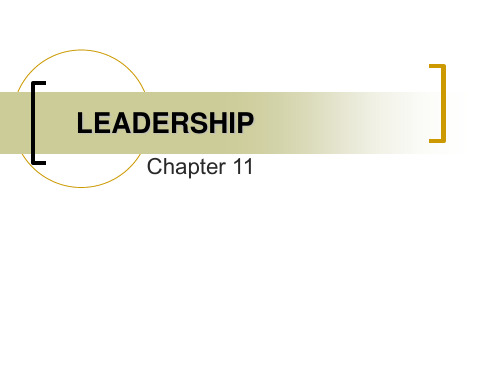
Who Will Lead? (cont)
➢ Demographic background of leaders
▪ Height, weight, & age ▪ Ethnicity ▪ Sex: Bias against women (even thought women
possess more skills needed to be a successful leader).
➢ Practically
▪ productively, economically, idealistically
➢ Personally
▪ interpersonally, ethically, selfishly
➢ Scientifically
▪ empirically, conceptually
FiLedPlerC’s CSonctinagelnecy Theory
➢ High LPC leaders most effective in “moderately” favorable situations
➢ Low LPC leaders most effective in very favorable or very unfavorable situations
Criticisms include most of research was in the lab
Path-Goal Theory (House 1971)
Path-goal theory focuses on the kinds of leader behaviors that allow subordinates to achieve personal and organizational goals
Lesson_12_Leadership_(领导力).pptx
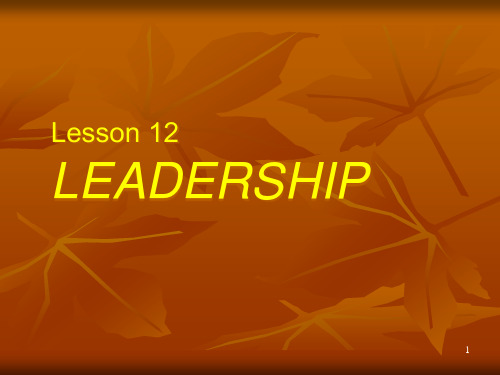
Leading is the process of creating vision, inspiring commitment and directing humanresource efforts toward organisational objectives (Schmerhorn).
Key Words: Influencing; Organisational Objectives; Vision; Inspiration; Commitment
3
WHY STUDY LEADERSHIP?
Employees believe that organisational successes and failures are linked to leadership. (Robbins)
Based on the assumption that certain physical, social, and personal characteristics are inherent in leaders;
Argues that presence or absence of these characteristics distinguishes leaders from nonleaders.
Corp)
cont…
5
Quotes on Leadership
In any case, leadership is finally a collaborative endeavour. (Warren Bennis, author and leadership scholar)
Leadership领导力演示课件

Who Will Lead? (cont)
➢ Demographic background of leaders
▪ Height, weight, & age ▪ Ethnicity ▪ Sex: Bias against women (even thought women
possess more skills needed to be a successful leader).
What is Leadership ?
“The process of influencing the activities of an organized group in its efforts toward goal setting and goal achievement” (Stogdill, 1950, p. 3)
▪ Trait Model: The great leader theory ▪ Situational Model ▪ Interactional Model: depends on the leader,
followers, and the Great Man Theory
only the great people possessed them
The Great Man Theory
➢ Personal qualities of leaders
▪ Personality traits, such as extraversion, conscientiousness, and openness.
➢ Practically
▪ productively, economically, idealistically
➢ Personally
Lecture 4 Leadership (1) 领导力
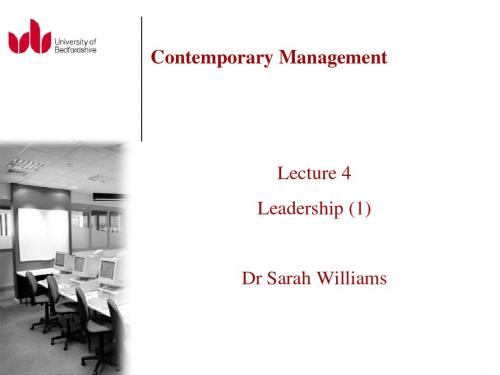
Lecture 4 Leadership (1)
Dr Sarah Williams
Learning Outcomes
To start thinking about how different ideas about leadership relate to contemporary management
Contingency Theories
Trait and behavioural theories shed light on
different aspects of leadership yet they do not
take into consideration the context within a leader operates. This is a limitation that the contingency theory aims to address as it contends that leaders have to diagnose the
are leaders born or bred?
Where the authority and power to lead
comes from
And Maslow & Herzberg’s theories of
motivation
Management & Leadership
administration
Moving forward
Key themes of contemporary management are COMPLEXITY & CHANGE
领导力讲义
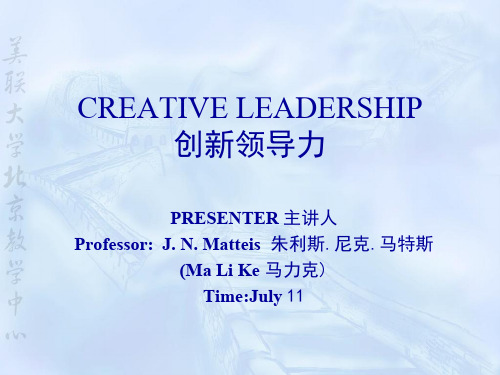
WORKPLACE REVOLUTION 工作场所的革命
• No life-time employment
没有终生就业
• End of corporate responsibility
公司责任结束
• Beginning of individual responsibility
个人责任开始
• Job can change 4 -5 times
1. POWER
权利
2. UNDERSTANDING PEOPLE
了解他人
3. INSPIRING FOLLOWERS
鼓舞追随者
4. ADOPTING A FLEXIBLE STYLE
采取灵活的风格
EFFECTIVE LEADERSHIP 1
有效领导 1
DEVELOPING YOURSELF
开发自己
GUIDE OTHERS TO SUCCESS 引导别人成功
CONTRASTS 对比
MANAGERS 经理人
• FOCUS ON TASKS 聚焦任务
• ADMINISTER 管理
• STABILITY 稳定
• RULES/CONTROL 规则/控制
• ASK HOW, WHEN 询问如何、何时
• SHORT-RANGE 近程
BECOME MORE SENSITIVE
更加敏锐
BECOME MORE CREATIVE
更加有创造力
REDUCE TIME WASTERS THROUGH DELEGATION
通过委托减少时间浪费
DEVELOP ORGANIZATIONAL SKILLS
开发组织技巧
DEVELOP EFFECTIVE COMMUNICATION SKILLS
Leadership领导力PPT演示课件

Wraphic background of leaders
Height, weight, & age Ethnicity Sex: Bias against women (even thought women
possess more skills needed to be a successful leader).
Three key components to this definition:
- an interpersonal process between one person and a group
- can’t have ‘leaders’ without ‘followers’
- criterion for effective leadership = goal
Leaders are born (but leaders are also “made”) All groups have leaders (large groups tend to
require a leader) People resist their leaders (most groups accept
followers, and the group situation.
7
The Great Man Theory
Early explanations of leadership studied the “traits” of great leaders
“Great man” theories (Gandhi, Lincoln, Napoleon) Belief that people were born with these traits and
Leadership 领导力(2)
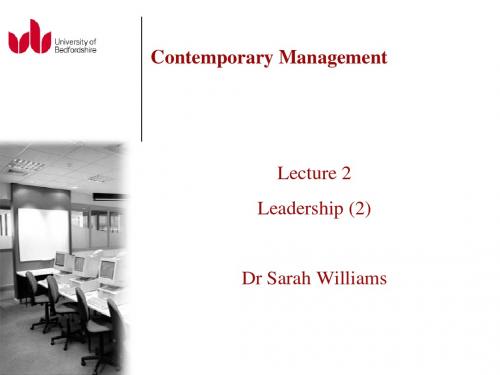
• Global economy, marked by freed trade, free flow of capital & cheaper foreign labour markets • Sophisticated communications and transportation technologies and services • Mass migrations • Level of economic activity outgrown national markets • International agreements reducing the cost of doing business
– Predatory pricing and employee lawsuits Reference: /office/entrepreneurs/articles/115557.asp x
What makes a business a business?
5. Risk Aversion Pberg (Just Business: Business Ethics in Action, 2000)
Ethical Dilemmas
Ethics: Principles of right and wrong
that individuals, acting as free moral agents, use to make choices to guide their behaviors
1. Golden Rule
• Do unto others as you would have them do unto you
管理学课件第章领导Leadership
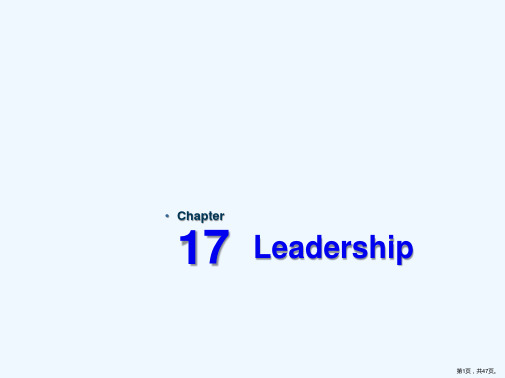
• Differentiate between transactional and transformational leaders. • Describe charismatic and visionary leadership. • Discuss what team leadership involves.
7
第7页,共47页。
Exhibit 17–2
Behavioral Theories of Leadership(行为理论)
8 第8页,共47页。
Exhibit 17–2 (cont’d)
Behavioral Theories of Leadership
9 第9页,共47页。
Early Leadership Theories (cont’d)
• Explain the dual nature of a leader’s behavior.
2 第2页,共47页。
L E A R N I N G O U T L I N E (cont’d)
Follow this Learning Outline as you read and study this chapter.
➢ Places managerial styles in five categories:
❖ Impoverished management(贫乏型(1,1) ) ❖ Task management (任务型 (9,1) )
❖ Middle-of-the-road management (中庸之道型(5,5) ) ❖ Country club management (乡村俱乐部型 (1,9) ) ❖ Team management (团队型 (9,9) ) ❖ 结论表明管理者应该采用 (9,9) 风格
Leadership(卓越领导力和领导艺术)培训课件
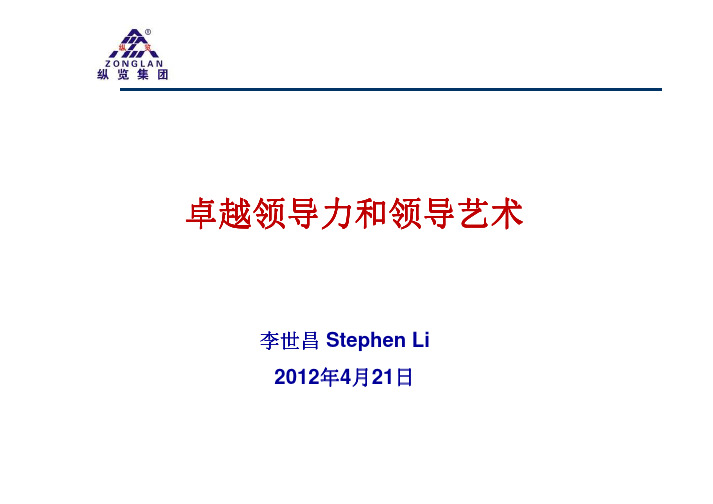
卓越领导力和领导艺术李世昌Stephen Li2012年4月21日课程提纲 创新变革者——学习力及其艺术组织领导者——影响力及其艺术团队建设者——凝聚力及其艺术人性沟通者——表达力及其艺术工作教练者——指导力及其艺术人才选用者——开发力及其艺术能力发展者——培养力及其艺术战略管理者——决策力及其艺术绩效驱动者——激励力及其艺术开场白领导力(Leadership):一个人最重要的资产企业层面:个人领导力团队领导力组织领导力没有领导力就没有执行力!创新变革者——学习力及其艺术1.“我是拥有智慧的我是拥有智慧的,,但我拥有的是昨天的智慧但我拥有的是昨天的智慧。
”——杰克·韦尔奇2. “与改变世界相比与改变世界相比,,改变自己更困难”。
——曼德拉 3. 人最难的就是始终要有初学者的心态人最难的就是始终要有初学者的心态!!——乔布斯学习型组织 自我超越改善心智模式共同愿景团队学习系统思考彼得.圣吉的代表作《第五项修炼——学习型组织的艺术与实务》1990年在美国出版该书在1992年获世界企业学会最高荣誉开拓奖圣吉本人也同年被美国《商业周刊》推崇为当代最杰出的新管理大师之一。
《第五项修炼第五项修炼》》命运性格习惯行为观念观念((思想思想))心态认知学习态度态度,,观念观念,,习惯习惯的的改变改变会会很难。
eg. 十指交叉游戏但往往但往往不习惯的时候就是成长的时候不习惯的时候就是成长的时候居安思危革故鼎新自强不息穷变通久Video:鹰之重生鹰之重生“取得成功的方法就是取得成功的方法就是757575--80%80%靠领导靠领导靠领导,,其余其余202020--25%25%靠管理靠管理靠管理,,而不能反过来而不能反过来。
”——约翰-科特(John P. Kotter)美国哈佛大学终身教授,2001年10月,《商业周刊》杂志称其为美国第一“领导力大师”2004年被评为全世界最具声望的五位管理和商业领袖之一。
领导讲义英文(ppt 23页)

1.Ohio State studies
in the late 1940s
• Identify independent dimensions of leader behavior. beginning with over 1000 dimensions
• management coping with complexity,leader coping with change,developing a vision of the future; most firms are underled & overmanaged
Transition in ห้องสมุดไป่ตู้eadership theories
What makes an effective leader
• the 1st approach sought to find universal personality traits that leaders had to some great degree than nonleaders
• explain leadership in terms of the behavior a person engaged in
• Identify traits consistently associated with leader: ambition & energy,the desire to lead,honesty & integrity, self-confidence, intelligence,job-related knowledge
• “false starts” based on their erroneous conception
- 1、下载文档前请自行甄别文档内容的完整性,平台不提供额外的编辑、内容补充、找答案等附加服务。
- 2、"仅部分预览"的文档,不可在线预览部分如存在完整性等问题,可反馈申请退款(可完整预览的文档不适用该条件!)。
- 3、如文档侵犯您的权益,请联系客服反馈,我们会尽快为您处理(人工客服工作时间:9:00-18:30)。
LEVEL 3 – COMPETENT MANAGER
第3级– 胜任的经理
LEVEL 2 – CONTRIBUTING TEAM MEMBER
第2级– 有贡献的团队成员
LEVEL 1 – HIGHLY CAPABLE INDIVIDUAL
第1级– 很有能力的个人
WHAT MANAGERS DO 经理人做什么
诚信工作
TO LEAD IS TO SERVE
领导就是服务
LEADERSHIP DEVELOPMENT
领导力的开发
READ BUSINESS BOOKS (GI=GO) 阅读商业书籍 LISTEN AND OBSERVE 倾听和观察 KEEP A JOURNAL TO REFLECT ON YOUR EXPERIENCES 反思你的经历,用日记记录下来 STUDY (ALONE, WORKSHOPS, COURSES) 学习(单独,讲习班,培训班) GET HELP FROM A MENTOR(BECOME ONE) 从恩师处得到帮助(成为一员) HELP FROM A COACH (Become One) 从教练处得到帮助(成为一员) GET FEEDBACK 获得反馈 DELEGATE ROUTINE TASKS 委托日常任务 PRACTICE DIFFERENT STYLES 练习不同风格 TAKE ON MORE CHALLENGING TASKS (Apprenticeship Model) 承担更多有挑战性的任务 (学徒模型)
企业需要自我导向,有责任的工人,他们愿意负责,表达见解,产生有 创意的想法,分享积极意向…
Anyone can be an influencer, a role model, a mentor regardless of title or position.
不论头衔或位置,任何人都可以成为有影响力的人,一个好榜样,一个 导师
THE GALLUP SURVEY
盖勒普调查
• • • • • • • • • RESULTS OF A 29 YEAR SURVEY OF SUCCESSFUL MANAGERS 对成功经理们进行29年调查的结果 FINDINGS CONDENSED INTO 12 QUESTIONS
• 调查结果被浓缩为12个问题
通过课程、研讨会
AT HOME 在家里
ELEMENTS OF LEADERSHIP
领导元素
1. TAKING CHARGE
担负责任
2. STRATEGIC VISIONING
战略远见
3. COMMUNICATION AND TEAMWORK
沟通和团队协作
4. WORKING WITH INTEGRITY
• Need to tap pool of women
ORGANIZATIONS HAVE CHANGEIN ORGANIZATIONS
• • • • • • • 组织中的级别少了 官僚作风减少 权利更加分散 各级期望领导和管理 性能数据广泛得到利用 以客户为中心 对所有员工的培训
• • • THE UNTITLED LEADERS 无名领袖 LEADERSHIP WITH A SMALL 领导一个小“ 我 " CLERKS, ACCOUNTANTS, MANAGERS, SALESPEOPLE,
ASSISTANTS, ETC.
• 文员、会计、经理、营销员、助理等 SMALL THINGS WE CAN DO TO POSITIVELY 可以积极地做小事情 ANYONE, ANYWHERE, EVERY DAY, CAN MAKE 任何人、任何地点、每一天、可以做事
People who believe that everyone has remarkable potential that should be tappe
每个人都有巨大的潜力可以挖掘
People who seize the opportunity in every interaction to lead, guide, support…
WORKPLACE REVOLUTION 工作场所的革命
• No life-time employment
没有终生就业
• End of corporate responsibility
公司责任结束
• Beginning of individual responsibility
个人责任开始
• Job can change 4 -5 times
开发有效沟通技巧
LEARN MORE, READ MORE, LISTEN MORE
学更多,读更多,听更多
EFFECTIVE LEADERSHIP 1
有效领导 1
DEVELOPING YOUR SUBORDINATES
开发你的下属
AT WORK
工作中 THROUGH COURSES, WORKSHOPS
工作可以变换4 -5次
• Need to learn more, add value to what we can bring to the NEXT employer 需要了解更多我们可以带给未来雇主的附加值 • Pressure to re-invent yourself
• • 重新设计自己的压力 需要开发女性员工
•
LEADERSHIP FOR EVERYONE (Peter J. Dean)
做每个人的领导(彼得j.院长)
Many organizational structures are lean. 许多组织结构是有偏向的。 Businesses need self-directed, responsible workers who are willing to take charge, express insights, come up with creative ideas, share positive intentions …
WHAT LEADERS DO 领导做什么
TAKE CHARGE OF THE ORGANIZATION 肩负组织的责任 LEAD THROUGH RELATIONSHIPS 通过关系领导 PAY CLOSE ATTENTION TO THEIR PEOPLE 密切关注员工 MAKE STRATEGIC DECISIONS 做出战略决策 BEHAVE ETHICALLY 遵守道德 DEMONSTRATE DIPLOMACY / TACT 展现外交/机智 GET 360 DEGREE FEEDBACK 获得360度反馈 ASSUME RESPONSIBILITY 获得360度反馈 INFLUENCE OTHERS TO FOLLOW 影响他人追随 GUIDE OTHERS TO SUCCESS 引导别人成功
COMMUNICATE
沟通
PUT OUT FIRES
救火灾
GET THE JOB DONE
完美地完成工作
MANAGE HUMAN RESOURCES
力资源管理
MANAGE THE DETAILS
管理细则
NETWORK
网 络
DIRECT, CONTROL, LEAD, COACH
指导,控制,领导,教练
领导、指引、支持人们在每一次互动中抓住机遇
People who care enough
给人足够的关怀
GOOD TO GREAT 《从优秀到卓越》
(JIM COLLINS)(吉姆· 柯林斯)
LEVEL 5 LEADER (Humility + Will)
第5级领导(谦逊+意志)
LEVEL 4 - EFFECTIVE LEADER
Every interaction with others is an opportunity
与他人的每一次互动都是一个机会
EVERYDAY LEADERS
领导人的每一天
People who show responsibility in their sphere of influence
人们在其势力范围表现他的责任
处于权利和权威的地位(总裁,通用电器公司,首席执行官)
THE ACTIONS OF A PERSON IN CHARGE OF A COMPANY
公司负责人采取的一系列行动
BROADER VIEW
广义观点
LEADERSHIP IS A PROCESS OF INFLUENCING OTHERS TO REACH ORGANIZATIONAL GOALS
领导力是影响他人达到组织目标的过程
GETTING RESULTS THROUGH PEOPLE
通过人来达到结果
POSITIVE INFLUENCE
积极的影响
AN INVITATION TO GREATNESS
走向伟大
A ROLE WE ALL CAN PLAY
我们都可以当领导
FUNDAMENTALS OF LEADERSHIP 领导力的本质
BECOME MORE SENSITIVE
更加敏锐
BECOME MORE CREATIVE
更加有创造力
REDUCE TIME WASTERS THROUGH DELEGATION
通过委托减少时间浪费
DEVELOP ORGANIZATIONAL SKILLS
开发组织技巧
DEVELOP EFFECTIVE COMMUNICATION SKILLS
• LESS BUREAUCRATIC
• MORE DECENTRALIZED
• EXPECTATION THAT ALL LEVELS WILL LEAD AND MANAGE
